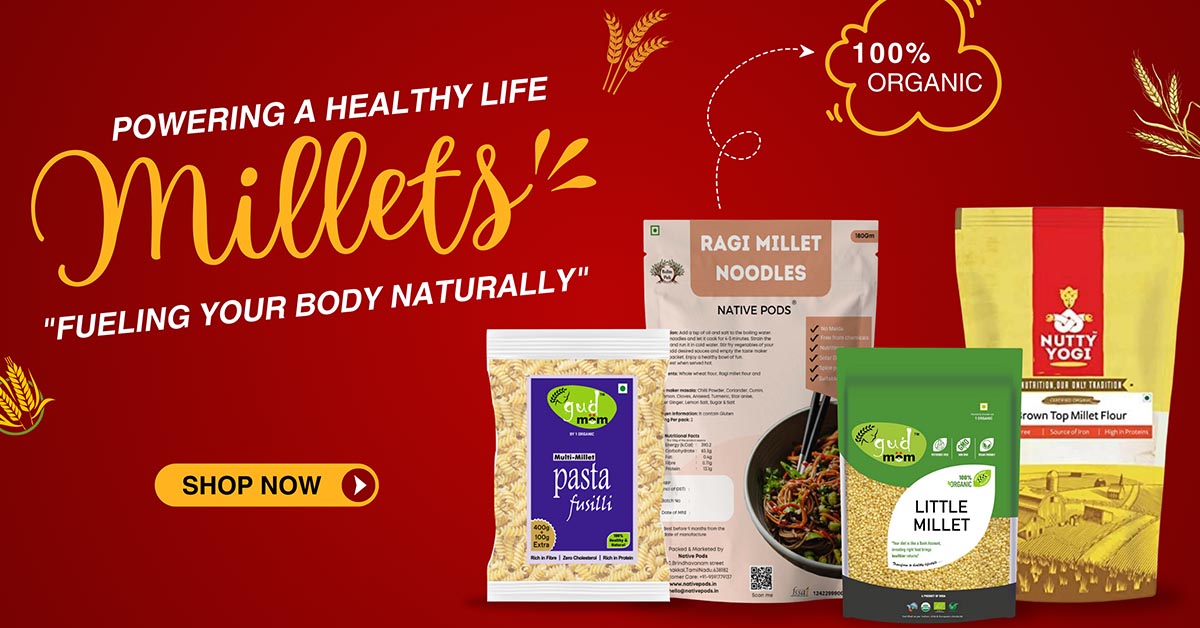In the quest for healthier eating and sustainable living, one often stumbles upon the unsung heroes of the grains world—millets. These unassuming tiny grains have been nourishing communities for centuries, and they hold a wealth of benefits that can transform our diets and lifestyles. In this blog, we’ll take a closer look at millets, exploring their incredible health benefits, and nutritional value, and even addressing some potential side effects. Millets have quietly gained recognition for their numerous health advantages. These ancient grains, often overshadowed by the more common rice and wheat, are making a grand comeback. First and foremost, millets are a boon for digestive health. Loaded with dietary fiber, they promote smooth digestion and help manage weight effectively. Plus, millets boast a low glycemic index, making them a wise choice for those concerned about blood sugar levels.
Millets are packed with essential minerals like magnesium, phosphorus, and iron, which are good for bones and can prevent anemia. They’re gluten-free, making them great for those with gluten sensitivities. Millets are rich in B-complex vitamins, folate, and antioxidants that fight off diseases. They also support heart health by lowering cholesterol. All these benefits makes millets one of the best choices of a healthy grain.
However, as we explore the benefits of millets, it’s essential to also be aware of potential side effects, which we’ll discuss in detail later in this blog. Knowing both the advantages and precautions will empower you to make informed decisions about incorporating millet into your daily meals. So, join us on this journey as we dive deeper into the world of millets, uncovering their incredible health benefits, and nutritional value, and addressing any concerns about side effects. Discover how these unassuming grains can be a game-changer for your health and well-being.
What are millets?
Millets are small grains that people have been growing and eating for a very long time. They are good for you because they have lots of vitamins and minerals, are easy to digest, and can help control blood sugar. Plus, they don’t have gluten, so they’re suitable for people who can’t eat gluten. Millets are also kind to the environment because they need less water to grow. You can use millet to make many different foods like porridge, bread, and even desserts. They’re a healthy and sustainable choice for your meals.
Also Read:- Makhana Benefits for Skin
Millet Grains and its types
There are different types of millet grains based on size and color. Mostly, millets are bifurcated based on large millets and small millets. The bifurcation is as follows:
Large Millets
Pearl, sorghum, foxtail, finger and proso millets forms the large millets. All these types of millets have been described below:
Pearl Millet: This type of millet is found to be in white, yellow or gray colors. It is one of the most common types of millet and one of the biggest millets of around 3-5 mm.
Sorghum Millet:
It comes in different colors like white, yellow or red and comes in size of around 4-6 mm.
Foxtail Millet:
These grains are about 2-3 mm and comes in black, white or yellow colors.
Finger Millet:
It is also called as ragi. It comes in brown color and only 1-2 mm long.
Proso Millet:
This type of millet is usually in white, yellow or brown color. These grains are usually about 3 mm long.
Small Millets
Little, barnyard, browntop, and kodo millets forms the small millets. All these types of millets have been described below:
Little Millet: As the name suggest they are little in size of around 2-3 mm long and is found to be in colors of gray and white.
Barnyard Millet:
These millets are usually found in gray and white colors. They are around 3 mm long.
Browntop Millet:
These millets are 4-5 mm long and its colors vary from tan to white.
Kodo Millet:
It comes in dark brown and blackish color and the kodo millets are 3-4 mm long.
12 Benefits of Millet That You Should Know
In the quest for a healthier and more sustainable diet, it’s time to turn our attention to an age-old superfood – millet. These small, unassuming grains have been nourishing civilizations for centuries, and they come packed with a wealth of benefits that can positively impact your well-being. In this blog, we’ll embark on a journey to uncover the remarkable advantages of incorporating millets into your diet, highlighting eight key benefits that make these grains a true nutritional powerhouse.
Here are twelve benefits of including millet in your diet:
Nutrient-Rich:
Millets are packed with essential nutrients like vitamins (especially B-complex vitamins), minerals (like magnesium and phosphorus), and dietary fiber, promoting overall health.
Digestive Health:
The high fiber content in millets aids digestion, prevents constipation, and supports a healthy digestive system.
Also Read:- Best Makhana Brands
Blood Sugar Control:
Millets have a low glycemic index, helping regulate blood sugar levels and reducing the risk of diabetes.
Heart Health:
They contain heart-healthy fats and can lower cholesterol levels, contributing to cardiovascular well-being.
Gluten-Free:
Millets are naturally gluten-free, making them suitable for individuals with celiac disease or gluten sensitivities.
Also Read:- Best Millet Brands in India
Weight Management:
The fiber in millets helps you feel full, reducing overeating and aiding in weight control.
Bone Health:
Millets are rich in minerals like phosphorus and magnesium, which are essential for maintaining strong and healthy bones.
Antioxidant Properties:
Millets contain antioxidants that combat harmful free radicals, reducing the risk of chronic diseases like cancer and heart disease.
Incorporating millet into your diet can offer a range of health benefits and contribute to a balanced and nutritious eating plan.
Also Read:- Different Types of Millets
Promotes Anti-aging:
Millets contains phytates and phenols which helps in protecting cells from many diseases and helps in anti-aging of the body.
Improves mood and builds healthy cells
Millets are rich in vitamins which helps in building healthy cells. Also millets have high concentration of the amino acid which helps in reducing depression.
Enhances Overall Immunity
Millets is extremely rich in nutrients and essential vitamins and minerals which helps in promoting overall well-being. It increases overall immunity of the body which keeps the diseases and other health issues away.
Environment Friendly
Millets is one such crop which can grow easily even in worst of environment conditions. It needs very less water to grow and it is a very environment friendly crop.
Millets Nutritional Value and Facts
Here is a comprehensive list of the amazing nutritional facts of millet.
(Data is presented per 100 grams of Millet)
| Calories | 378 Kcal |
| Protein | 11g |
| Sodium | 5mg |
| Pottasium | 195mg |
| Dietary Fiber | 8.5g |
| Vitamin B-6 | 0.384mg |
| Vitamin E | 0.05mg |
| Vitamin K | 0.9mg |
| Magnesium | 28% |
| Zinc | 11% |
Millets Side Effects
While millets offer a multitude of health benefits, it’s essential to be aware of potential side effects, although these side effects are generally rare and mild. Here are some considerations:
Allergic Reactions:
Some individuals may be allergic to millets, although such allergies are relatively uncommon. Symptoms may include hives, itching, swelling, or difficulty breathing. If you suspect an allergy, consult a healthcare professional.
Digestive Discomfort:
Millets’ high fiber content can cause digestive discomfort, especially if consumed in large quantities or if your body is not accustomed to dietary fiber. Common symptoms include bloating, gas, or diarrhea. Gradually increasing your millet intake and drinking plenty of water can help reduce these issues.
Goitrogenic Properties
Millets contain compounds known as goitrogens, which can interfere with thyroid function when consumed excessively. However, cooking millets effectively reduces goitrogenic properties, making them safe for most people.
Oxalate Content:
Some millets, such as finger millet (ragi), have moderate oxalate content. Consuming foods high in oxalates may contribute to the formation of kidney stones in susceptible individuals. If you have a history of kidney stones, consult your healthcare provider before including millets in your diet.
It’s important to note that the majority of people can safely consume millet without experiencing any adverse effects. However, if you have specific dietary concerns, allergies, or underlying health conditions, it’s advisable to consult a healthcare professional or a registered dietitian before making millet a significant part of your diet. Additionally, maintaining a balanced diet that includes a variety of foods can help minimize the potential side effects associated with any single food item.
-
Native Pods Ragi Millet and Little Millet₹26019% OFF Shop Now
How to prepare and eat millets
Millet is a very versatile food and can be used as a substitute of many other cereals like rice , white etc.
Millet has phytic acid in it. In order to remove phytic acid from millet, soak them in water for 30-45 minutes. Rinse them in fresh water before cooking.
To prepare millet, add 2-3 cups of water and add 1/2 to 1 cup of millet in it. Now let it boil and simmer for 25-30 minutes. After these steps let it cool down a bit and it is ready to be consumed.
Some others ways millets can be consumed are :
- Millets in chocolate bar
- Millets with Banana
- Millet as granola
- Millets as flour
Conclusion
In conclusion, millets are undeniably a nutritional powerhouse, offering a host of health benefits that can positively impact your well-being. From being rich in essential nutrients like vitamins, minerals, and dietary fiber to aiding in digestive health, blood sugar management, and heart health, millets have rightfully earned their status as a superfood.
While it’s essential to be aware of potential side effects such as allergies, digestive discomfort, or, in rare cases, thyroid interference and kidney stone risk, these concerns are generally minimal and manageable. Cooking and processing millets effectively reduce many of these potential issues. So, are millets good for your health? The resounding answer is yes. Millets are an excellent addition to a balanced diet, and their numerous benefits far outweigh the potential drawbacks. Whether you’re looking to improve your nutrition, manage your weight, or simply diversify your meals sustainably, millets offer a versatile and nutritious solution.
Incorporating millet into your diet can contribute to a healthier lifestyle and a more sustainable food system. So, embrace the marvels of millets and savor the goodness they bring to your health and overall well-being.
















































